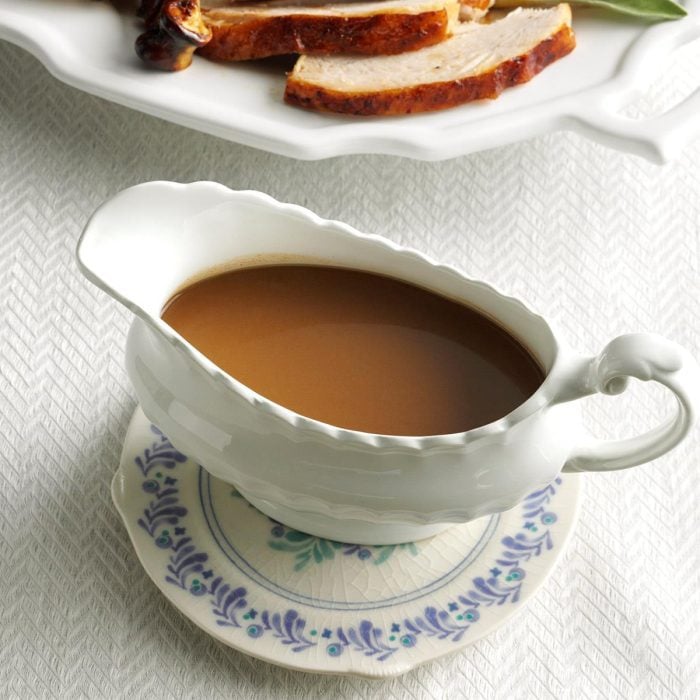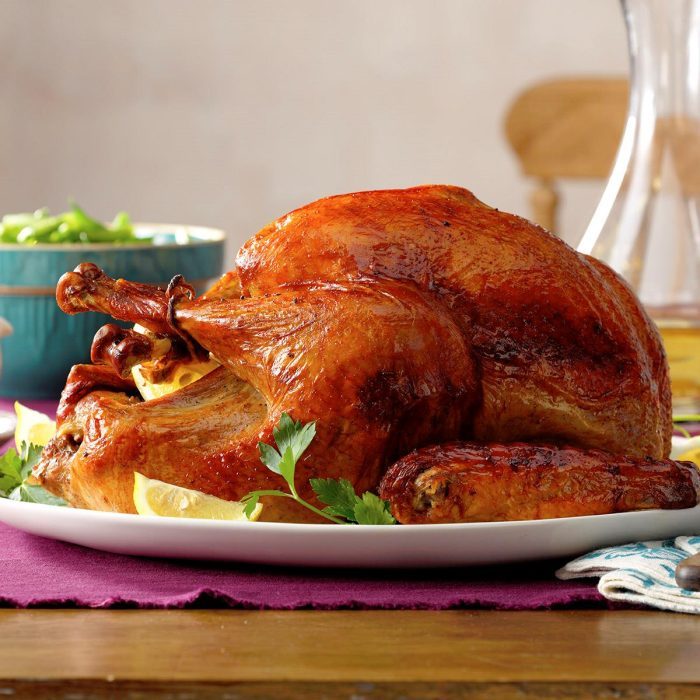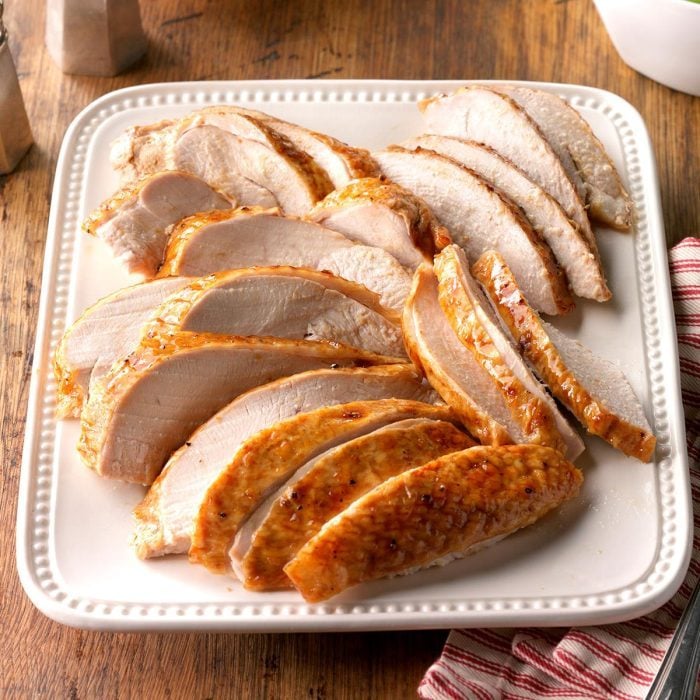Make your Thanksgiving turkey more flavorful than ever with our top turkey tips. In no time, youll know how to season a turkey that guests will crave.
With Thanksgiving just around the corner, you’re sure to have your menu planned from the best Thanksgiving sides to perfect pumpkin pies. And of course, you’ve got the traditional turkey lined up.
Whether you’re serving up a small gathering of close friends and family, or throwing a Friendsgiving get-together, you’ll want to get (and serve) the perfect turkey for everyone at the dinner table. Make sure you know how much turkey to serve per person, so you grab the right size bird for your holiday dinner.
But before you pop your perfectly chosen turkey into the oven, don’t forget to season it well. The right Thanksgiving turkey recipes paired with pitch-perfect seasoning can turn your turkey from a basic bird to a fantastic fowl. Follow these tips and tricks on seasoning your turkey for a juicy and flavorful meal.
Seasoning a turkey before cooking is absolutely essential for getting the most flavorful and juicy meat. While some people may think simply sprinkling on some salt and pepper right before putting the turkey in the oven is enough, properly seasoning a turkey requires a bit more time and effort. However, the payoff is well worth it.
When you season a turkey in advance, the salt, herbs, spices, and other aromatics have time to thoroughly penetrate and tenderize the meat. This results in a turkey that is moist, flavorful, and delicious all the way to the bone.
So when is the best time to season a turkey? Should you season a turkey the night before cooking, a few days in advance, or right before roasting? What are the different methods for seasoning turkey? Let’s take a closer look at how to perfectly season a turkey every time.
When Should You Season a Turkey?
-
Seasoning a day or two before cooking is ideal. This gives enough time for the seasoning to permeate the meat.
-
For wet brining or dry brining, seasoning 1-2 days before is best.
-
Quick seasoning with oil, herbs, salt and pepper can be done right before cooking.
-
Make sure to take the turkey out of the fridge at least 1 hour before cooking to bring it to room temperature after brining.
So in general seasoning a turkey 1-2 days in advance is best for maximize flavor and tenderness. However a quick seasoning right before roasting can still do the trick. Avoid seasoning too far in advance, like 4-5 days before cooking, as the turkey may become overly salty.
Seasoning Methods for Turkey
There are several different techniques you can use to perfectly season a turkey
Wet Brining
This involves submerging the turkey in a saltwater solution for 4-24 hours. The salt penetrates the meat, makes it incredibly moist and tender, and allows it to retain more flavor. A basic brine is just water and kosher salt. For more flavor, add aromatics like peppercorn, bay leaves, onions, garlic, citrus, or fresh herbs.
Dry Brining
Dry brining is similar to wet brining, but without the liquid. Simply rub the turkey all over with kosher salt and let it rest uncovered in the fridge for 8-12 hours. The salt will draw out moisture from the skin, which then gets reabsorbed along with the salt, tenderizing the meat and enhancing flavor.
Herb Butter
Coating a turkey with a compound butter seasoned with fresh herbs and citrus zest adds wonderful aroma and keeps the meat moist Gently loosen the skin and smear the flavored butter underneath over the breast meat for maximum impact
Spice Rubs
For easy seasoning, use your favorite spice rub. First pat the turkey dry, then generously apply a prepared rub all over the skin, under the skin, in the cavity, and even between the legs and wings. Spice rubs add wonderful flavor with no prep needed.
Flavor Injectors
Injecting a turkey with a seasoned liquid like broth, melted butter, or marinade infuses it with flavor from the inside out. Just be sure to use a liquid that will easily pass through the injector needle.
Extra Flavor Boosts
Aside from the basic seasoning techniques, there are some additional tricks that can really take your turkey flavor to the next level:
-
Stuff the cavity with aromatics like onions, garlic, citrus, and fresh herbs.
-
Marinate the turkey for a few hours in advance.
-
Baste the turkey as it roasts for crispy, flavorful skin.
-
Glaze the turkey toward the end of cooking for gorgeous color and flavor.
-
Serve with giblet gravy for the perfect, rich finishing touch.
Seasoning a Turkey Breast
A boneless turkey breast is easier to cook than a whole bird, but seasoning it properly is still key for the best results. Wet brining or dry brining a turkey breast 1-2 days before cooking allows the salt and other seasonings to fully penetrate the meat.
For a quick cook, simply rub down the turkey breast with olive oil, salt, and pepper. Smearing it with an herb butter also adds wonderful flavor. Cook the breast bone-in and skin-on for optimal moisture and crispier skin.
Common Seasoning Mistakes
It’s easy to miss the mark when seasoning a turkey. Here are some key mistakes to avoid:
-
Not seasoning in advance – Last minute seasoning won’t fully penetrate or tenderize.
-
Using too much salt if wet brining – Overly salty meat.
-
Skipping the skin – Get seasoning under skin for most flavor.
-
Using stale spices – Refresh seasonings for every use.
-
Being too light-handed – Generous seasoning is needed.
-
Forgetting the cavity – Season inside the cavity as well.
-
Cooking right after brining – Let turkey air dry after brining.

Crack Open a Beer
Just like you might use beer to make Can-Can Chicken or beef brisket, you can use beer to flavor your holiday turkey. Instead of basting your bird with drippings from the pan, baste with your go-to brew. No need to splurge on anything too fancy here, but make sure it’s a good beer that you’d enjoy sipping.

This method might seem a little intimidating, but it packs a serious punch when it comes to boosting your turkey’s flavor. Flavor injectors work by pumping extra ingredients (think broth and melted butter) right into the center of your bird for extra moisture and an extra tasty turkey.

Coat with Flavored Butter
When hasn’t butter made something better? Rub flavored butter underneath the skin of your turkey to add another layer of flavor to your traditional turkey while also crisping up the skin.
This is really an easy way to add flavor to your main course, so for those hosting a Thanksgiving dinner, don’t be afraid to try this technique.

Marinades aren’t just for the grill! Try marinading your turkey in a mixture of broth, spices, and lemon juice, like in our Marinaded Thanksgiving Turkey for a roast that’s flavorful through and through.
Similar to brining, your turkey should sit in the marinade for a few hours to soak up all the delicious flavors.

Layer on the flavor with a bright and aromatic glaze. Brushing on a glaze takes an already tasty turkey skin to the next level. Glazes are an easy and quick way to give your main course an extra boost.
You can make an apricot-glazed turkey with just four ingredients.

How to prep a turkey for roasting
FAQ
Should I put butter or oil on my turkey?
Do you season ground turkey before or after cooking?
Should I put anything inside my turkey before cooking?
Do I need to season a Turkey before cooking?
Yes! It doesn’t so much matter when you season your bird—whether it’s just before popping it in the oven or several days in advance for a dry-brine technique —as long as you season it before it gets cooked. This is essential for the butter, herbs, and whatever other seasonings you use, to flavor the skin and meat of the turkey.
Can one have turkey and carrots?
Eating turkey and carrots is part of healthy habits. The turkey has meat like chicken and is another healthy poultry option. Carrots are rich in carotenoids, it is a source of vitamin A, fiber, potassium and vitamin B3.
How do you season a Turkey?
Slather on butter and seasoning. Spreading on a spice rub or herbaceous compound butter is a genius way to bring big flavor to a turkey. Either can be applied directly to a turkey. Rub a spice blend all over the skin of the bird, and sprinkle it in the cavity, too, to season the turkey from the inside out.
Should you season a Turkey under the skin?
To get the most flavor, however, it’s best to season under the skin. This is our greatest tip for teaching anyone how to season a turkey. This puts those spices in direct contact with the meat for maximum impact.
